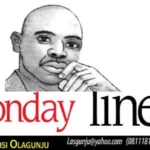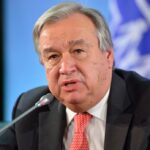4 years ago on October 20, 2020, my ongoing journey began with the Lekki Massacre, which happened just a couple of kilometres from my apartment. Within the next 17 days, I was forced to smuggle myself out of Nigeria and I haven’t been able to go back since.
In the intervening period, I have spent time in a Ghanaian safe house, I have been declared wanted for “national security violations” in Nigeria, and I have survived a kidnap/assassination attempt in Accra organised by the (now former) Director of the National Intelligence Agency, Ahmed Rufai Abubakar.
In all this time and across all these experiences, one piece of wisdom I heard from my good friend @YarKafanchan has never left my head and remains my true north. She said it in passing one evening in 2021 when we were hanging out at Breakfast 2 Breakfast, Osu, and she probably didn’t realise that what she said was so profound that it would remain stuck in my head forever.
She said: “Nigeria’s biggest trick is convincing you that nothing is happening. Meanwhile everything is happening.”
She said that in the context of us figuring out whether the Buhari regime had forgotten about teaching us #EndSARS people a lesson, and if we should risk returning home, but I took that pearl of wisdom, expanded its application, and made it my True North for analysing Nigeria.
Nigeria was not always this way, but after decades of deliberate actions by internal and external actors, it has become the country where “nothing happens.” When it comes to anything consequential, meaningful and positive like favourable trade policy, economy-boosting infrastructure projects, or diplomatic and geopolitical positioning to enhance regional integration, nothing happens in Nigeria. It is frozen in time and covered with dust and cobwebs. To all intents and purposes, nothing is happening.
But behind the scenes, when it comes to listening to the counsel of American econmic hitmen and piling on ruinous dollar-denominated debt that the country categorically does not need, or when it comes to spending billions of dollars to develop military, intelligence and law enforcement capacity, only to use it to monitor the young girlfriends and political opponents of middle aged big men with potbellies, everything is happening. Nigeria may not be able to generate more than 5,000 MW of electricity for 200 million people, but when it comes to using NIA field agents – actual intelligence operatives trained expensively in Israel and North Korea – to go after outspoken Nigerian citizens in foreign countries, everything is happening.
This is why I cannot bother myself with who Peter Obi chooses or does not choose to wish Happy Birthday to. It’s not that I don’t think Yakubu Gowon is a genocidal a-hole. It’s that his involvement in what happened between 1966 and 1970 is not even the worst or most disastrous thing he has done. The worst things Yakubu Gowon did came AFTER the war, and they are why we are where we are today.
Nigeria as it existed then, was one of the most powerful countries in the entire Global South, and a very consequential country on the world stage. Nigeria was a country that funded liberation movements in other countries, used its economy and military to massive geopolitical effect in Africa, gave out foreign aid, and came within one Ajaokuta Steel Complex of becoming Africa’s first proper industrial economy.
Most of this period, when Nigeria was one of the world’s real movers and shakers in the decade between 1970 and 1979, fell under Yakubu Gowon’s tenure. The Nigeria he had was a country where everything was happening, and everybody could see that everything was happening. Nigeria was one of the players moving pieces on the global chessboard, and not merely one of the pieces being moved.
Yakubu Gowon had the unique opportunity with a postwar Nigeria that found itself economically, militarily and geopolitically in the proverbial Garden of Eden, to lead the country into World Power status. There was a perfect storm of geopolitical circumstances, and Nigeria was right in the sweet pot. The country had real money to spend on infrastructure and industrialisation, and very little foreign debt. It had de-facto geopolitical leadership of Sub Saharan Africa, and infinite possibilities for continental alignment and integration. He didn’t even have to worry about winning an election every 4 years. All he had to do was deliver leadership
If he had delivered Sub Saharan Africa’s first industrialised nuclear power, Africa and the African diaspora would have finally had an untouchable base to build from, and the world would never again have been able to treat Black people with the levity it continues to do in 2024. I am 34 this year. Gowon became Head of State at 33. He found himself leading this budding postwar superpower with everything falling into place for it at 37. And what did he do with this once-in-a-century opportunity?
He did Cement Armada. Udoji Awards. Offshore bank accounts. Contract and invoice inflation. Free Nigeria Airways flights for anyone who could get a “note” from a military officer, which eventually ran the airline into the ground. Cars, houses and holidays in London for girlfriends of big men in government. The beginning of the Rolls Royce culture in Ikoyi. During his 5 postwar years in power, Nigeria for the first time began piling on dollar-denominated foreign debt that it did not need, which was the fuel for the explosion that came 15 years later called IMF Structural Adjustment.
He met a country that was powerful and competent enough to hatch its own foreign influence and subversion operations around the world. Nigeria used to be so consequential that every single liberation war it directly or indirectly intervened in swung the way it wanted. From Lagos, the outcomes of liberation wars in Mozambique, Zimbabwe and Namibia were decided. By the time he and his mad dog successor Murtala Mohammed left the scene, Nigeria had gone from this to a victim – a country that couldn’t pay its debts, started suffering electricity blackouts, and ended up having American intelligence penetrate its core, to the point where the outcome of elections or post-coup succession was decided by people like Susan Rice.
It was once a country where everything happened in plain sight, but by the time Yakubu Gowon and the Class of 1966 were done, it became the Nigeria we know today – a benighted country where you have to be highly connected or extremely intelligent to even suspect when anything is happening, because to all intents and purposes, nothing ever happens.
The challenge for my generation and the coming ones is to hijack and regain control of our collective destiny, which Yakubu Gowon and his contemporaries lost for us. They inherited the Black world’s most powerful country and potent nation state. They bequeathed a parody of a country that has been fully captured by economic hitmen, where the CIA has been able to openly install a drug peddler with urinary incontinence to become puppet president of the largest Black country in the world – a level of blatant disrespect that illustrates just how much has been taken from us.
Instead of getting mad at Peter Obi for wishing such people Happy Birthday (which doesn’t actually change the figurative price of garri in the market), our generational challenge as Millenials and Zoomers is to wrest back control of our country and its governance, intelligence, law enforcement and military institutions from the foreign interests that took them from our 90 year-old “senior statesmen” who sold their children for the proverbial mirrors, gin and red cloth.
Getting angry at Yakubu Gowon is pointless and is not going to save us. Getting mad at people wishing him Happy Birthday is borderline asinine. He has already got what he wants out of life. At 90, he has amassed a lifetime’s worth of oyibo’s mirrors, gin and red cloth, and the Black superpower he once led is now dragging status with Eswantini and Sao Tome & Principe. We should be happy for him. He is a fulfilled man who led a life that clearly fills him with fulfillment.
We have our own mission now, and it is to start undoing his damage. In our lifetime, Nigeria should once again becomes a country where everything is happening. It has to happen soon. Otherwise, 200 million people go kpai.
Let’s be guided.
@David Hundeyin


























